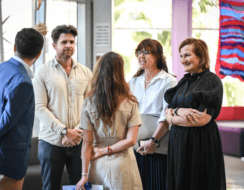04 Dec 2019
NewsFrom the CEO: A long route to safety
This is an incredible win on behalf of all of the people who remain on Manus Island, looking for a safe, permanent home. Behrouz’s New Zealand visa is only temporary, so uncertainty remains over his future. Behrouz has said that he still hopes to resettle in the United States, but has pointed to the lengthy delays under Australia’s exchange arrangement.
This highlights a recent change that I am concerned could threaten refugee resettlement as we know it. For the first time since records began, the US failed to settle a single refugee in October. At the same time, the US announced plans to almost halve its annual refugee intake to 18,000. This is another historic low from the long-time global resettlement leader — and a steep decline from the 110,000 intake ceiling President Barack Obama set.
As the US eschews its mantle of the world’s top country for refugee admissions, we have seen global displacement records hit record highs for consecutive years. The United Nations estimates there are close to 26 million refugees globally and only 92,400 people were resettled last year.
At SSI, we are watching these changes with concern and connecting with our colleagues globally. We have played a role in shaping UNHCR’s Global Refugee Forum this month and have contributed to the new Global Compact on Refugees which, among other things, is a mechanism designed to respond to this current mass displacement and ease the pressure on host countries.
In the face of these threats to our protection structures, we are also seeing more and more exploration of complementary pathways to safety.
What do I mean by that? The usual pathway for refugees to come to Australia is through our government-run program. People apply for refugee status while living in a third-party country, where they live until they are allocated a place as part of our annual humanitarian intake. Australia currently resettles 18,750 people per year.
Countries such as Spain and the UK are exploring refugee community sponsorship programs, which empower everyday community members to settle refugees. In Canada – where a community sponsorship program is well established – communities come together to combine their funds, time and support to bring individuals and families to safety.
Just this month, the Irish government launched its own community sponsorship program, which will offer safety to up to 50 refugees – including this Syrian brother and sister who are building new lives. SSI was one of just two Australian organisations invited to attend this launch and participate in discussions on global refugee sponsorship initiatives.
SSI is committed to work towards community sponsored pathways that harness the collective strengths of whole communities, in partnership with government, service providers and community organisations. We are committed to supporting the Australian government’s review of the current Community Support Program.
Another interesting solution comes from an organisation named Talent Beyond Boundaries, which uses talent mobility as a non-traditional refugee resettlement solution. The organisation connects skilled refugees with talent-short employers, in a win-win for both parties. Employers around the world are tapping into this initiative, including local businesses like tech company IRESS. SSI works in partnership with Talent Beyond Boundaries, offering critical settlement support to new arrivals.
I’m not advocating for one approach or the other, but what is clear to me is that at a time of global crisis, we must keep our hearts and minds open to new pathways to safety. Everyone deserves the opportunity to realise their full potential and live a life that is free and safe from war and persecution.
Violet Roumeliotis
SSI CEO


